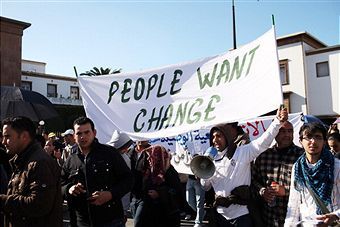 Three months ago the future looked bleak for the West. The countries that once dominated
the world, invented capitalism, articulated mankind’s universal desire for freedom and defended it against all enemies looked destined for an impoverished future squeezed by the authoritarian
capitalists of the East and unsure about the righteousness of its ideological foundation. Even one-time liberals, whose life has been shaped in a struggle for human rights embraced China and its
state-backed progress. Now, thanks to the pro-democracy protesters in the Middle East, the West is back.
Three months ago the future looked bleak for the West. The countries that once dominated
the world, invented capitalism, articulated mankind’s universal desire for freedom and defended it against all enemies looked destined for an impoverished future squeezed by the authoritarian
capitalists of the East and unsure about the righteousness of its ideological foundation. Even one-time liberals, whose life has been shaped in a struggle for human rights embraced China and its
state-backed progress. Now, thanks to the pro-democracy protesters in the Middle East, the West is back.
Not that it backed the democratic movements and now stands to reap the benefits. As Paul Wolfowitz said, the people are setting themselves free, and are doing so despite the West supporting their authoritarian leaders for more than 30 years. To be clear, the pro-democracy protesters are not looking to the West for guidance – and the absence of support has, in some cases, empowered them – making it harder for authoritarian leaders to blame the protests on the West. True, anger at rising food prices has been an explosive ingredient in the mix of grievances that triggered the fall of leaders in Egypt and Tunisia, and is now putting the heat on authorities in Libya and Jordan. But this is not only a matter of commodity prices – it is about repression, the lack of freedom and the absence of fundamental rights.
The revolutions that are spreading, however imperfectly, across the Middle East have put a number of issues back on the international table: principally democracy. Every European government is reviewing the role of democracy-promotion in its foreign policy. At the UN, the fact that Secretary-General Ban Ki-Moon had to make statements on the events means that the “sovereignist” agenda, which would have banished all internal matters of states from the UN’s purview, is no longer ascendant. Democracy is resurgent.
That, of course, does not mean it is back for good. Nor that the revolutions in the Middle East will automatically give way to democracies. There will be reversals in the process of political, economic, and social change in the Middle East. This does not make the Arab world unique. After all, to quote a Council on Foreign Relations report, “the evolution of American democracy includes not only the majesty of the Declaration of Independence and the Constitution, but also the blight of slavery, a civil war, the denial of women’s suffrage for well over a century, and the exclusion of African-Americans from formal participation until the enactment of landmark civil rights legislation.”
To help decrease the risk of reversals and safeguard the renewed belief in democracy and the West’s role in the world, the West needs to give something back to the protesters. It needs to help them as much as it can. Prime Minister David Cameron’s visit to the region is an important part of this. Telling the pro-democeacy activists and the military leaders that the process is not finished and that the West will stand by reform, as much as it forsook it in the past. That is the least the West can do in return for being given a new lease of life.






Comments